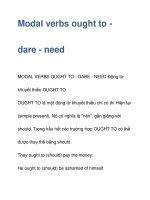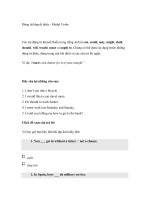37584 modal verbs phrases
Bạn đang xem bản rút gọn của tài liệu. Xem và tải ngay bản đầy đủ của tài liệu tại đây (295.19 KB, 4 trang )
ABILITY
The main modal verbs to express ability
are: can, could and be able to.
•
Use can/be able to to express
ability in the present. But in
common speech, it’s more common
to use can.
Examples: She can do computer graphics.
She’s able to do computer graphics.
• Use could or was/were able to
To express ability (but not a specific
achievement) in the past. But remember
you can only use was/were able to with a
specific achievement or event. (He was
able to win the price. NOT He could win
the price. But you can use could/be able
to (past) in the negative form to talk
about past ability.
Examples: He couldn’t play the guitar.
He wasn’t able to play the violin.
•
For all the other tenses, you must
use be able to in the suitable form.
Example: I will be able speak English if I
keep on practising.
REQUESTS
We often use: will, would, can, could and
would you mind/do you fancy...? to talk
about requests.
• Use will/can/could/would to ask
someone to do something.
Example: Can you turn on the TV, please?
Note that will/can are more informal,
whereas could/would are more polite.
•
In questions, to make them more
polite, you can add please.
•
Use would you mind.../do you
fancy... + GERUND to make polite
requests. (Note negative
statements as answer is positive).
•
In these requests, you are expected
to give a positive answer. If not,
you must give an argument.
PERMISSION
The main modals of
permission are: may, can, could, Do you
mind if...?, be allowed to and might.
• Use may/could/can to ask for
permission.
Examples: May I leave the room,
teacher?/ Can I come in?/ Could you open
the windows, please?
But, remember when we ask for
permission, it’s always something about
the present or the future. (it’s not the
past).
• Use Do you mind if...? in order
to ask for permission because
your
action
might
bother
someone.
Example: Do you mind if I leave the
room? Not at all. (The answer must be
negative if you can leave it).
• Use be allowed to to express
the permission that someone
has given to you.
Example: I’m allowed to leave. (someone
has given me the permission to leave).
• For the answers, you can only
use can/may. Could is only for
questions.
Example: Could I borrow the pencil? Yes,
you can. (NOT Yes, you could)
• Normally,
when
someone
refuses to give permission, he
always gives an argument to
explain it. But if the rules are
clear, then the answer is clear.
EXPECTATIONS
Use be supposed to for expectations.
• The main uses are:
o Rules and usual ways to do
sth.
o Predictions
o Hearsay (what people say).
o Plans or arrangements.
•
This modal verb can only be used in
present or past.
Examples: This beach was supposed to be
the best in Spain/ The groom is supposed
to arrive soon at the ceremony (tradition)
ADVICE
The main modals to talk about advice are:
should/ought to and had better.
• Use ought to/should to say
something advisable.
Examples: You should go to the dentist/
You ought to read the advert.
•
We use had better for an urgent
advice -when you believe that
something bad will happen if the
person doesn’t follow the advice.
Example: You’d better go to the doctor or
you’ll have serious problems.
Usually, we contract had better by
just adding ´d better. And the negative
form of it is had better not.
Remember, had better is only to
talk about the present or the future, not
the past.
• For questions, only should can be
used.
Example: Should I apply for that job?
• Normally, it’s impolite to advice
people if they hadn’t told you to
advice them. That’s why when you
want to advice somebody about
something, you should use adverbs
like maybe, perhaps, I think...
SUGGESTIONS
•
•
The main words to talk about
suggestions are: could, why
don’t...?, how about...? why not...?
let’s... and so on.
When we ask using why not and
why don’t/doesn’t to make a
suggestion, the speaker doesn’t
expect a complete answer. Just
adverbs like: Ok, it’s a good idea,
right...
•
Let’s... always includes the
speaker. (It is a suggestion for both
the speaker and the listener.)
Example: Let’s go to Pakistan (Both them)
•
a)
b)
c)
d)
Note the form of these expressions!
Let’s take the train.
Why don’t we take the train?
How about taking the train?
Maybe we could take the train.
•
ALSO REMEMBER TO ADD
THE ? to the questions!!
PREFERENCES
•
The main words to talk about are
prefer, would prefer and would
rather.
• Use these modal verbs to talk about
things that you like better than
others. But remember prefer is
used for general preference and
would rather and would prefer
for more particular situations.
• Prefer and would prefer may be
followed by a noun, gerund or
infinitive. Would rather can be
followed by only the base of the
verb.
• Use would rather not to refuse an
offer, suggestion or invitation.
Examples: Would you like to have some
dessert? I’d rather not. I’ve eaten too
much.
• When we want to compare, we
must follow this structures:
a) Lani prefers comedies to action films.
NOUN
b) I’d prefer visiting Lani to going there.
c) I’d rather watch football than play it.
NECESSITY
•
•
•
•
Use must and have (got) to to
express necessity.
Have to is the most common
expression in everyday use.
Have got to often expresses strong
feelings.
Must is used in writing (forms,
signs, notices) and in spoken
English in:
o The speaker has the power
(You must clean it).
o There’s urgent necessity.
REMEMBER! Mustn’t and don’t have to
have very different meanings.
•
Have to can be used in all tenses
and all forms. But must and have
got to only for present or future.
Use have to for questions.
CHOICE/NO CHOICE
•
Have to and must have very
similar meanings. They both mean
something is necessary or required.
• Must
normally
express
an
obligation and also something I say
I have to do. Have to is used to
say something that someone has
told me to do.
Ex. The teacher tells the students they
MUST do a composition and when the
class finishes, the Ss say, we HAVE TO do
a composition.
• Don’t/Doesn’t have to and must
have very different meanings.
Don’t/doesn’t have to indicates
something that is not necessary
(lack of necessity) and so that,
there’s choice (another possibility).
• Mustn’t means that something is
not allowed or it’s against rules,
there’s no choice.
• Must not is used to express
prohibition in writing. In informal
English, it’s more common to say
can’t.
• Not have to can be used with all
tenses and forms, but mustn’t can
only be used in present or future.
FUTURE POSSIBILITY
•
Use may, might, will, could or shall
to express future possibility.
Note: It’s not the same may be
than maybe. May + be it’s a modal
and a verb and maybe it’s an
adverb of possibility.
• Use may not/might not to
express
the
possibility
that
something will not happen.
• Use couldn’t to say that something
is possible.
• Might not is rarely contracted and
may not is never contracted.
• Use will/shall to talk about
predictions based on an opinion or
either a prediction about the future.
Shall is more polite than will.
• Questions about possibility aren’t
formed by may, might or could.
They are formed with the future
tenses (will, be going to...) and the
answer of these questions can be
these modal verbs.
Example: Will the office close early? It
may.
ASSUMPTIONS
•
We often make assuptions or
“best guesses” based on an
information we have about a
present situation. The modal we
choose depends on how certain is
our assumption:
AFFIRMATIVE
must
have (got) to
may
might/could
100 %
NEGATIVE
can’t /couldn’t
must not
may not
might not
0 %
•
When you are 100% sure that
something is possible, use must,
have to and have got to.
• When you are less certain, use
may, might and/or could.
• When you are 100% certain that
something
is
impossible,
use
can’t/couldn’t.
When you’re slightly less certain, use
must not, and when you are less
certain, use may/might not.
REMEMBER! have to/have got to can’t
be used to make negative assuptions.
• Use could in questions. But also,
(very rare) might/may can be
used.
• In short answers, use have (got) to
or a modal alone.
• Use be in short answers with bequestions.
ADVISABILITY IN THE PAST
•
Use should have, ought to have,
might have and could have to
talk
about
things
that
were
advisable in the past. These modals
often express regret and/or blame.
Example: “You might’ve told me” (You
didn’t told me, that wasn’t OK).
•
•
Should not have/Ought not to
have are the only forms used in
negative past advisability.
The most common in questions is
should have.
PRONUNTIATION: In informal english,
have is not stressed, that’s why you have
to pronounce like /a/. Example:
You could have visited him (You coulda)
SPECULATIONS ABOUT THE
PAST
ç
•
We often “speculate” or make “best
guesses”, about past situations
based on the facts that we have.
The modal we choose depends on
how certain are we about our
speculations.
AFFIRMATIVE
100 %
must have
had to have
may have
may have
could have
NEGATIVE
can’t have
couldn’t have
mustn’t have
may not have
might not have
0 %
•
When you are almost a 100%
certain
that
something
was
possible, use must have or had to
have.
Examples:
-These stones are very big.
SPECULATION: They must have been
hard to move.
•
•
•
•
When we are less certain use:
may/might/could have.
When we are a 100% sure that
something is impossible, we use
can’t/couldn’t have.
When something is slightly less
certain, use must not and when
something
is
less
certain:
may/might not.
We use could have in questions
about possibility.









